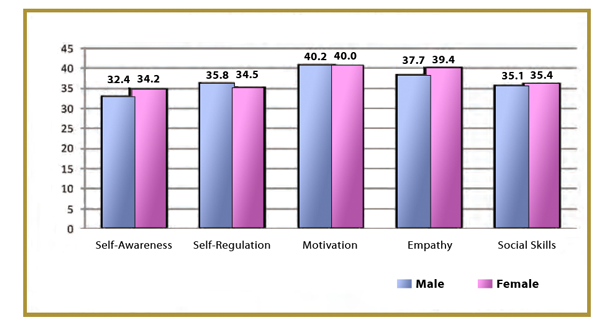
Update: This article was last updated on 12th January 2026 to reflect the accuracy and up-to-date information on the page.
In the pursuit of personal development, you may encounter two essential concepts: Emotional Maturity and Emotional Intelligence (EQ). While these terms are often used interchangeably, they hold distinct meanings and play crucial roles in how we manage emotions and interact with others. Understanding these concepts can enhance self-awareness, improve social interactions, and contribute to overall emotional well-being.
Recommended reading: Tips for Building Emotional Strength
Emotional Intelligence?

Image source: hptbydts
Women generally display higher levels of overall Emotional Intelligence compared to men. This includes greater interpersonal and intrapersonal Emotional Intelligence, Empathy, and Self-Awareness. Although the differences are small, women consistently score higher in these areas. However, when it comes to Self-Regulation, Motivation, and Social Skills, there are no significant gender differences. Both men and women exhibit these traits similarly, demonstrating that while there may be slight variations in certain aspects of Emotional Intelligence, other skills remain consistent across genders. Understanding these nuances can help in fostering better communication and emotional understanding in various contexts.
Emotional Intelligence (EQ) is the ability to recognize, understand, and manage one’s own emotions and the emotions of others. Popularized by psychologist Daniel Goleman, EQ comprises five key components:
- Self-Awareness: Recognizing and understanding your own emotions.
- Self-Regulation: Managing and controlling your emotions.
- Motivation: Channeling your emotions towards achieving goals.
- Empathy: Understanding and sensing the emotions of others.
- Social Skills: Effectively managing relationships and social interactions.
Recommended Reading: Best Emotional Intelligence Quotes
Emotional Maturity

Emotional maturity refers to an individual’s level of emotional development and stability. It involves a deep understanding of one’s feelings, recognizing emotional triggers, and responding positively rather than reacting negatively. Emotionally mature individuals take responsibility for their actions, exhibit self-discipline, and delay gratification when necessary. They also maintain composure during challenging situations and ensure others feel acknowledged and understood.
Recommended Reading: Top Emotional Intelligence Books
Signs of Emotional Immaturity

To better understand emotional maturity, it’s helpful to recognize signs of emotional immaturity. Emotionally immature individuals may:
- Use an accusatory tone: “Why do you always have to be so dramatic?”
- Shift blame: “It’s your fault I’m behaving this way.”
- Aggress: “You’re so stupid!”
- Victimize themselves: “I guess I’m just a terrible person.”
- Avoid responsibility: “I don’t like this feeling, so you have to fix it.”
- Cry for help: “Never mind, I won’t contact you again.”
- Gaslight: “That’s not what happened, and I never said that.”
- Blame others: “You’re so needy.”
These behaviors reflect a lack of emotional development and can be harmful in relationships and social interactions.
Recommended Reading: Top 5 Skills That Are Not Taught In School
Emotional Intelligence in the Workplace
Developing emotional intelligence is crucial for building meaningful connections and achieving success both personally and professionally. Goleman’s research suggests that EQ is twice as important as cognitive intelligence (IQ) for predicting career success. High EQ leads to better working relationships, problem-solving skills, efficiency, and effectiveness.
In fact, 71 percent of employers prioritize a high level of emotional intelligence over technical skills when evaluating candidates. Emotionally intelligent individuals excel in taking criticism constructively, establishing boundaries, engaging in self-reflection, avoiding rumination, building healthy relationships, and creating supportive environments.
The Difference Between Emotional Maturity & Emotional Intelligence
While emotional maturity and emotional intelligence are interconnected, they are distinct. Emotional Intelligence provides the foundation for understanding and managing emotions, while Emotional Maturity involves applying this understanding in real-world situations. Emotionally mature individuals not only comprehend emotions but also demonstrate resilience, adaptability, and composure under stress.
Emotional maturity enhances the practical application of emotional intelligence, ensuring that insights gained through EQ are effectively used to navigate life’s challenges, foster personal growth, and build meaningful relationships.
Developing Emotional Intelligence
Improving your emotional intelligence involves several key steps:
- Increase Self-Awareness: Regularly reflect on your emotions and their impact on your behavior.
- Practice Self-Regulation: Learn techniques to manage stress and control impulses, such as mindfulness and deep breathing exercises.
- Enhance Social Awareness: Pay attention to non-verbal cues and practice active listening to better understand others’ emotions.
- Build Relationship Management Skills: Focus on clear communication, conflict resolution, and fostering positive relationships.
- Cultivate Empathy: Put yourself in others’ shoes and strive to understand their perspectives and feelings.
Why Emotional Maturity and Emotional Intelligence Matter
Both emotional maturity and emotional intelligence are crucial for personal and professional success. Emotional maturity fosters resilience, adaptability, and stability, leading to improved overall well-being. Emotional intelligence enhances interpersonal relationships, communication, and collaboration, promoting success in both personal and professional spheres. Developing these traits contributes to better decision-making, effective problem-solving, and heightened self-awareness, creating a foundation for a fulfilling and balanced life.
Conclusion
Emotional maturity and emotional intelligence are essential components of personal development. By understanding and cultivating both, you can enhance your ability to navigate the complexities of human emotions, build stronger relationships, and achieve greater success in all areas of life. Together, they create a dynamic synergy that empowers you to understand yourself and those around you more deeply, leading to a more harmonious and fulfilling existence.
Looking for a comprehensive parenting guide to ensure you are on the right track? Explore a wealth of parenting wisdom and educational insights in Moonpreneur’s blogs. Additionally, you can join our programs that nurture the next generation of innovators. Book a free trial now!
Frequently Asked Questions:
Emotional intelligence (EI) focuses on recognizing, understanding, and managing one’s own emotions and the emotions of others. Emotional maturity (EM), on the other hand, refers to the application of this emotional understanding in real-world scenarios, emphasizing stability, resilience, and responsible behavior.
Yes, emotional intelligence can be learned and developed through practices such as self-awareness, empathy, emotional regulation, and effective communication. Regular reflection and mindfulness can also enhance EI.
Emotional maturity develops through life experiences, introspection, and learning from mistakes. It involves gaining deeper insights into one’s emotions and responses, and adopting a balanced, responsible approach to handling emotional challenges.
Emotional intelligence is crucial in the workplace because it enhances interpersonal relationships, communication, and collaboration. It leads to better conflict resolution, teamwork, and leadership, contributing to overall organizational success.
Improving emotional maturity involves self-reflection, accepting responsibility for actions, practicing patience, and developing resilience. Learning to respond thoughtfully rather than reacting impulsively is key.
Books like “Emotional Intelligence 2.0” by Travis Bradberry and Daniel Goleman’s works are excellent resources. Additionally, training programs, workshops, and online courses focused on EI can provide valuable tools and techniques.
Emotional intelligence improves personal relationships by fostering empathy, better communication, and emotional understanding. It helps in managing conflicts, building trust, and creating stronger, more meaningful connections.
While it’s possible to have high emotional intelligence (the ability to understand and manage emotions), true emotional maturity (applying this understanding in real-life situations) often requires a deeper level of personal growth and stability.
Signs of emotional maturity include the ability to delay gratification, handle stress effectively, take responsibility for actions, and maintain composure in challenging situations. Emotionally mature individuals also show empathy and understanding toward others.
Both emotional maturity and emotional intelligence are essential for personal development because they enhance self-awareness, emotional stability, and interpersonal skills. They contribute to better decision-making, healthier relationships, and overall well-being.

























